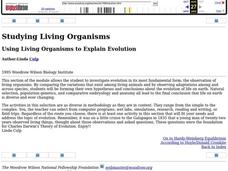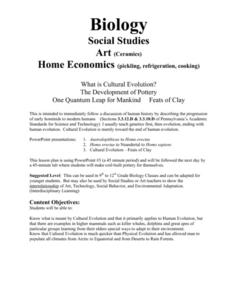Curated OER
Cartoons and Protest
Students examine political cartoons from 1774 through today, determine their meanings through analysis and discussion, and create their own political cartoons focusing on historical issues studied in class.
Florida International University
The Good, the Bad and the Nasty Tasting
Examine the benefits of chemical defense mechanisms. Organisms in oceans use chemicals to ward off predators. Duplicate this adaptation using a hands-on experiment in which you ward off your predators (your pupils) with some...
Curated OER
Module 1, Unit 2, Lesson Plan 2: PCR and DNA Diagnosis
Students discuss the importance of the Polymerase Chain Reaction for biologists. They explain what factors make the Polymerase Chain Reaction possible. Students explain the steps in thermocycling and what happens during each step.
Curated OER
Galileo's Thermometer: Measuring the Density of Various Unknown Liquids
Sprouting scientists explore the concept of density by making mass and volume measurements for five different liquids. From these measurements, they calculate densities. They apply their learning to explain Galileo's thermometer works...
Curated OER
Vocab-u-lous! Build a Fabulous Vocab
In this vocabulary worksheet, students decipher which word would complete the sentence best. All words begin with the letter "G."
Curated OER
Making Moths
Young scholars study the Gregorian Calendar and its historical significance.In this calendar lesson students create a calendar design for an imaginary planet.
Curated OER
Scientists
Students discuss a number of career possibilities in science. They also examine a scientist's work.
Curated OER
Diamonds Are Forever - Most of the Time!
Learners examine the compositions and structure of diamonds. They conduct an experiment growing crystals, watch a video, and conduct Internet research.
Curated OER
Eighteen Ways to Make a Baby
Students view a video clip about post-menopausal women having children. They identify the ethical, legal and social implications of this. They also read a case study.
Curated OER
Volume of Gas
Eighth graders investigate the effect of temperature on the volume of a gas in a closed container. They measure the height of the water in their beaker/container, conduct their experiment, and create a graph to illustrate their data.
Curated OER
Using Living Organisms to Explain Evolution
Students investigate evolution in its most fundamental form: the observation of living organisms. By comparing variations that exist among living animals, students formulate their own hypotheses and conclusions about the evolution of...
Curated OER
Make Acid Rain
Students create models of the earth's atmosphere to explore how gases that are dissolved in water can eventually create acid rain. After conducting a series of experiments within their models of the earth's atmosphere, students analyze...
Curated OER
GPS Ecosystem (Ecotone) Scavenger Hunt
High schoolers describe the characteristics of an ecotone. In this ecotone lesson plan, students pick out their area and describe the visual appearance, conditions, ecosystem, biodiversity, predators, prey, and trees in their ecotone....
Curated OER
Carbon Dioxide
Students conduct a series of experiments to explore carbon dioxide properties. In this chemistry instructional activity, students explain the production and uses of this gas. They measure its amount in soda and waste product of yeast.
Curated OER
Branches of Science Lesson Plans
Teachers can use branches of science lesson plans to get students excited about science careers.
Curated OER
Pendulum Power
Eighth graders study the Law of Conservation of Energy and the Second Law of Thermodynamics. they create a pendulum out of either a rope with a bowling ball or barbell tied to one end.
Curated OER
Roots of the Documents of Freedom
Students examine and analyze various excerpts from documents of freedom such as Magna Carta and Virginia Declaration of Rights, identify how documents influenced each other, and discuss ideas and rights necessary to build representative...
Curated OER
How Many Days Are in a Year?
Students create a calendar for an imaginary planet. For this earth science lesson, students analyze the errors on the different calendars used on Earth. They present their work in class.
Curated OER
Using Sterile Techniques as a Tool in Studying Plant Diseases
Seventh graders examine the concept of sterile techniques. They realize that plant diseases can be identified and classified in various way. Students identify some of the diseases that attack the garden plants.
Curated OER
Interview A Famous Greek
Students become acquainted with historical people of Greece through research and role playing. They develop interview and research strategies which get to an historical person's achievements and personality.
Curated OER
A "Real" Picuture of a Scientist
Students share their own stereotypes when they talk about scientists. In groups, they draw a picture of a scientist where they are working and the tools they most commonly used. Using the internet, they discover how archeolgists use the...
Curated OER
What is Cultural Evolution?
Students comprehend what is meant by Cultural Evolution and that it primarily applies at Human Evolution, but that there are examples in higher mammals such as a killer whales, dolphins and great apes of particular groups by exploring...
Curated OER
Not A Drop To Drink
Fifth graders discuss ways that humans pollute our natural water supply. They observe a video about water pollution. Students identify eight different ways water is contaminated. They investigate an oil spill by conducting a hands-on...
Curated OER
Making Subjects and Verbs Agree
In this grammar worksheet, students choose and circle the appropriate form of the verb that agrees with the subject in twenty-three sentences.























